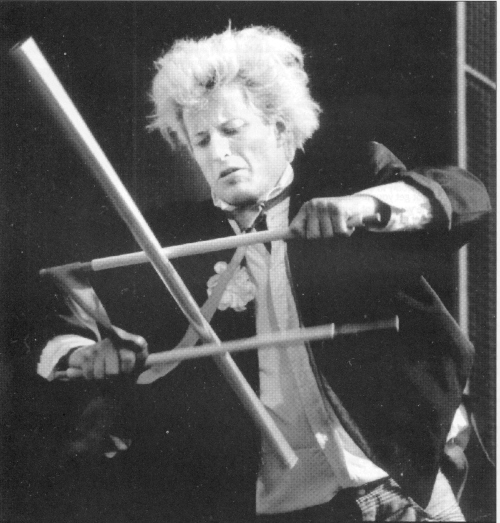
Daniel Gulko, Montreal festival Founders Award Winner - Judged as the best entertainer of the festival. but how would if have played to judges on the competition stage? |
Page 18 Spring 1993
|
The
Structure & Judging of Jugging
Competitions By
Arthur Lewbel
In
a poll a few years ago, a large majority of IJA'ers expressed
support for having juggling competitions, though there were
passionate disputes about how they should be judged. Having been
involved in both writing the rules and judging IJA competitions for
years, I have received reactions ranging from congratulations
to abuse in response to competition rules and outcomes.
At
the other extreme are the stage championships for seniors, juniors
and teams. The rules are essentially to do any juggling show, and
the "best" show wins, where quality is judged along a
large number of vaguely defined dimensions like difficulty,
originality, technique, execution and showmanship. The result is
basically a talent
show, in which equally qualified judges can (and do) arrive at
radically different rankings of the performers. This is true
regardless of whether the competitors are ranked ordinally against
each other, as was the case up until two years ago, or whether they
are ranked against some more broadly defined (cardinal) standard of
excellence as in the current modified Kappell system. (Those readers
familiar with measure theory will recognize the mathematical
significance of referring to these systems as ordinal vs cardinal).
Intrinsically,
cardinal rankings are more difficult to arrive at than ordinal ones,
just as it is easier to tell from the ground which of two mountains
is taller than it is to determine the exact height of each.
However,
the lJA's Kappell system only requires a coarse cardinal ranking
into gold, silver, bronze or no medal (with, as currently
implemented, almost no act being good enough for gold). So, under
the old system it was necessary to tell which of two almost equally
good acts was better, while under Kappell both acts can be given a
silver. In the mountain analogy, if two mountains have similar
heights it may be easier to say both are very high than to determine
which is higher.
The
difficulty in judging the stage championships is not primarily
whether the ranking is ordinal or cardinal, but rather in the
subjective nature and, more importantly, the number of different
criteria that must be weighed together in determining the outcome.
The problem can be viewed as one of "estimating" the true
quality of each act. In statistical analyses,
the more variables a problem has, and the greater the measurement
errors in those variables, the less accurate are the resulting
estimates. The only solutions are either to accept the ambiguity of
the results or to reduce the dimensionality of the problem.
Accepting the ambiguity means that as long as competition performances are allowed to be any juggling show, there will a ways be legitimate disputes about who should have won, regardless of how the rules for judging are structured. Reducing the dimensionality of the problem means designing a new type of competition, more like judged Olympic sports. The problems in judging sports like gymnastics and figure skating are analogous to judging juggling, and the Olympic solution is to reduce the dimensions of the problem (i.e. the number of criteria considered) to a manageable number, and to make each of the criterion be as objectively measurable as possible.
There
are many ways to reduce dimensions. For example, a competition could
be restricted to a single prop (say, just balls). Juggling tricks
could be classified roughly by type (e.g., numbers, body throws,
bounce moves, intricate patterns, contact moves, transitions, etc.,.)
and by difficulty. Once a group of judges had codified a number of
standard moves along these lines, new tricks that appear in
competitor's performances could be classified by analogy to existing
moves, with extra points being awarded for originality. This is
essentially what is done in rhythmic gymnastics, where competitors at
the junior level do only already classified moves and tricks (which
obviously simplifies judging), with the pros creating new moves within
preexisting classifications.
Other
ways of eliminating dimensions would include restricting each
performance to a precise number of each type of move, and placing
limits on costumes, music (say, none with lyrics), or even on the type
of prop stand.
Anything
that removes differences between acts, especially differences that are
only tangentially related to the juggling itself, results in
performances that can more objectively ranked, and hence reduces
ambiguity about who the winner should be.
There
is a fundamental tradeoff. The more we restrict performances to
"look the same," the more accurately they can be judged,
compared and ranked. But the more constraints we impose on
performances, the less is the scope for originality. Ultimately, the
current free form of competitions results in the most entertaining
theatre and the most debatable judging, while at the other extreme the
current numbers competitions are the most boring to watch and the most
objectively measured. In addition to these extremes, I believe that
many jugglers would like to see (and enter) Olympic style juggling
events, each of which could be judged with some degree of objectivity
while still allowing a great deal of inventiveness, entertainment
value, and originality. Certainly Olympic style competitions are very
popular for many other movement skills, from diving to figure skating
to gymnastics.
"The
Academic Juggler" is an occasional feature of Jugglers World,
and is devoted to all kinds of formal analyses of juggling.
Anybody who has suggestions, comments, or potential
contributions for this feature is encouraged to write to
me (Arthur Lewbel, Lexington, MA). |

Daniel Gulko, Montreal festival Founders Award Winner - Judged as the best entertainer of the festival. but how would if have played to judges on the competition stage? |